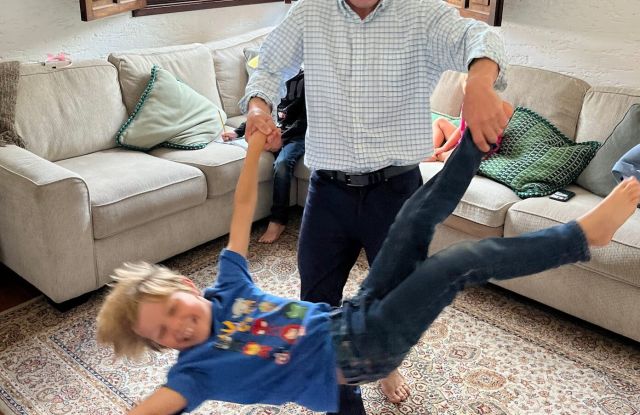The 20 year responsibility project

 God’s design for the parenting process is that we should take our children and turn them into responsible adults. We do this by allowing them more and more autonomy as they get older.
God’s design for the parenting process is that we should take our children and turn them into responsible adults. We do this by allowing them more and more autonomy as they get older.
5% a year
A good rule of thumb is that each year, you as a parent should release another 5% of the decisions you make for your child to your child. So at two years old, you may make 90% of your child’s decisions and at three, you release another 5% and now your child self-governs 15% of the time.
Using this rough calculus, by the time your child is 18, you should have released responsibility for 90% of your child’s life to them. And if you are making decisions for your kid in their 20’s you are probably enabling them. In their 20’s, people should be thinking for themselves and running their own lives. You as a parent are given a 20 year project of turning your children into responsible adults.
Does this mean that your child shouldn’t consult with you about decisions when they are 21? Of course not, but realize that there is a big difference between a consultant who points out issues or asks clarifying questions and a parent who fails to see that the time for their child to take control of their life has come and gone.
Children should have everything they need at age 20 to self-govern, setting appropriate boundaries and goals.
Problems in letting go
Feeling this gap, not wanting to make the same mistake, baby boomers crowd the sidelines of their kids’ little league soccer games. And they continue to hover in their children’s lives as they get older. They live with the remote control in their hands and don’t know how to set it down. They organize their lives around their children and use technology to perpetuate their dysfunction.
What parents need to realize is, they should not organize their parenting as a way of addressing gaps in their own upbringing. Giving their child too many trophies and too much attention does not make him a better adult, it just spoils him. Children need to feel the consequences of their decisions if they are ever to grow in wisdom. There is no substitute for pain – life is full of it and parents can’t ultimately protect their adult children from it.
RX for broken parenting
• Adapt your parenting style to address what your child needs to become an autonomous adult, not around your needs.
• Ask yourself, “What do I need to let go of?” Each new year, your child should be making more of their own decisions.
• Talk to your child about how they can show themselves responsible and begin to exercise more control over their life.



Great blog…. 🙂
I bet most ten year olds think that they would love to make 90% of their decisions at that age. lol
Haha, good call, Kay.
Fantastic one, Seth. Enjoyed it.
Not anticipating using it anytime soon, but whatever the Lord wills . . .
This is good! Thanks
I like the 5% concept…makes a lot of sense to me.
I think you touched on one of the hardest parts of being a mom: not losing your identity in your children. It’s become an acceptable norm that your children become who you are, especially if you stay at home with them. I can’t really think of any great role models for not doing that.
Would love to hear Karen’s perspective or thoughts on this.
Excellent!
As a side note, my boys have been firmly informed that there are no participation awards/trophies in our home because they are meaningless. We also strive for a gradual turn over of responsibility.
The 5% concept does seem to be more difficult for the mother. I am interested to hear more perspectives from the moms in the crowd.
Excellent encouragement as my oldest is now 16 and will be leaving the nest in just a couple of years. Sending her to Swaziland this past summer with AIM was one of the best things we’ve ever done! I trust her so much more now with responsibilities and independence as she has proven herself capable in so many ways. I recommend the AIM Ambassador program HIGHLY for parents who need to let their chicks do a little nest-flying before the final launch.
I’ll be sharing this on fb and on my blog AND will be sending another daughter this summer and my oldest son the summer after. There’s a whole lot of MacLellan kids to go thru the AIM system. 😉
good blog seth. thank you, your parenting stories really speak to me, especially having met some of your children briefly and seeing how they are living this all out in their 20’s!
jen, i agree with you. it is really hard to be a stay at home mom and NOT totally find your identity in the kids and I have been looking for good role models in this area too! i keep wondering where the “Moms version” of this blog is (no offense to you, seth!) and would love to hear more wisdom from moms who are a little farther ahead than me on this path, with our oldest only 8. let me know if you find that…
let me recommend Juli Slattery on the http://www.listen.family.org/toughquestions/ site. she’s the best i know on this (other than Karen).
I think the root for mom’s is identity. Where does our identity lie? We tend to see our roles as our identity. I have the role of wife, mother, teacher, friend, housekeeper and the list goes on. But if all those things go away who I am? When we find our identities in our roles we lose the ability to have integrity in the roles we play because we “need” them in order to function. We become needy. When we are needy we become self – serving.
Another important thing to establish is a mission statement for the family and particularly for the raising of the children. Begin with the end in mind. What product do you want to produce? How do you want the children to turn out at the end of your stewardship of them? Keep it general enough to use for 18 – 20 years, yet specific enough to have something to benchmark the choices and decisions that are made. We must make our mothering/parenting decisions based on principles. It seems to me that society today tends toward activity based parenting rather than principle based parenting. Principle based parenting requires swimming upstream, lots of courage and lots of prayer.
Great blog Seth and very good point Karen in re: to a family mission statement.
I also think we as mommy’s need to have our own, independent from the family, mission statement. Even though there are different seasons in our lives, I think our mission statement can ebb and flow with those changes but still be a benchmark for how we commit we our time.
(I especially like the part about caring for orphans in Africa)
Thanks for your insight.
Thanks, Karen, for your insight. I have been mulling over it all day and I am going to share it with some others. Appreciate your thoughts.
I agree Joy that it’s good to make a mission statement for yourself as well. One of the things I did that I enjoyed while the children were young was to pick one thing that was new to me to learn about for that year. I felt intellectually stimulated as well as having something that was just “mine.” One year I learned all about backpacking. That year was so wonderful I extended it to 2 years and it’s now a life long love. Another year I learned all about raising chickens and we bought 6 chickens and ducks. While I still love chickens I do not like ducks and am not interested in raising them anymore but it was a fun year! Another year I subscribed to a cooking magazine and expanded my repertoire. My goal was to make 2 new recipes a week. That was a fun one too! The sky is the limit!
What she doesn’t tell you is that we came home from church one Sunday and the kids screamed when they saw what had happened. Some coyotes got into our chicken and ducks. Not a fun day on the farm…